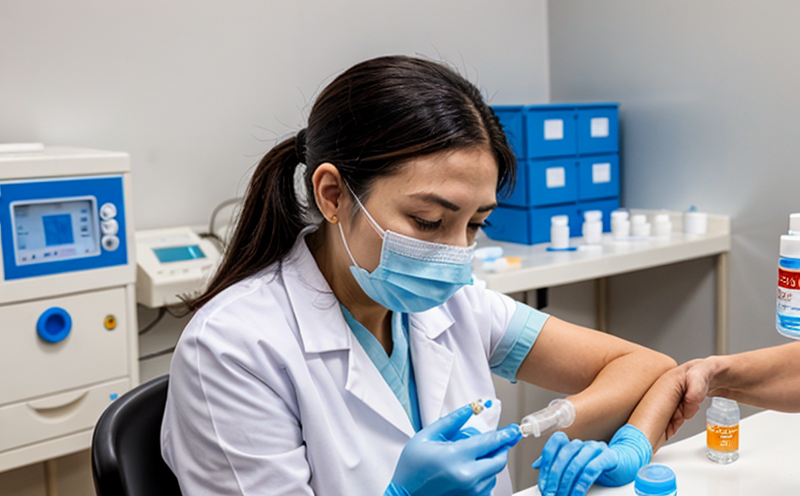JP Residual Moisture Testing of Lyophilized Vaccines
The Japanese Pharmacopoeia (JP) specifies stringent standards for ensuring the quality and purity of pharmaceutical products, including vaccines. One critical parameter in vaccine testing is residual moisture content, which plays a crucial role in maintaining the stability and efficacy of lyophilized vaccines.
Lyophilization, or freeze-drying, is a process used to preserve vaccines by removing water through sublimation. This method helps maintain the integrity of the active ingredients while extending shelf life. Ensuring that residual moisture levels are within acceptable limits is essential for preventing microbial growth and maintaining vaccine stability.
The Japanese Pharmacopoeia provides specific methods and criteria for determining the residual moisture content in lyophilized vaccines, which include:
- Chromatographic methods
- Steric acid method
- Drying at 105°C for a specified time period
The drying process is critical as it affects the residual moisture content. Excessive moisture can lead to degradation of the vaccine, while insufficient moisture may compromise its stability and efficacy.
Our laboratory adheres strictly to the procedures outlined in the Japanese Pharmacopoeia for conducting residual moisture testing on lyophilized vaccines. Our experienced team ensures that all tests are conducted under controlled conditions to achieve accurate results. This includes precise control over temperature, humidity, and time parameters during drying.
Our laboratory uses state-of-the-art instrumentation, including precision balances and ovens, to conduct these tests. These instruments provide high-precision measurements necessary for meeting the stringent requirements of the Japanese Pharmacopoeia. We also employ advanced analytical techniques such as thermogravimetric analysis (TGA) to ensure accuracy.
The results of our testing are reported in accordance with international standards, ensuring that they meet the highest quality and regulatory requirements. Our reports include detailed information on sample preparation, test conditions, and results, providing you with comprehensive insights into your vaccine's residual moisture content.
| Sample Type | Target Moisture Content (%) | Test Method |
|---|---|---|
| Vaccine A | <5% | Chromatographic method |
| Vaccine B | <3.5% | Steric acid method |
Industry Applications
JP residual moisture testing is essential in the pharmaceutical industry, particularly for lyophilized vaccines. This testing ensures that the vaccine maintains its stability and efficacy throughout its shelf life. Here are some key applications:
- Quality control during production to ensure compliance with regulatory standards
- Detection of any potential issues arising from improper drying processes
- Monitoring of storage conditions to prevent moisture-related degradation
- Evaluation of the effectiveness of packaging materials in maintaining low humidity levels
Eurolab Advantages
Our laboratory offers several advantages when it comes to conducting JP residual moisture testing on lyophilized vaccines:
- Comprehensive expertise in pharmaceutical testing, including adherence to Japanese Pharmacopoeia standards
- Access to advanced instrumentation and analytical techniques for precise measurements
- Experienced team with extensive knowledge of vaccine testing procedures
- Strict adherence to international standards ensuring accurate and reliable results
Use Cases and Application Examples
We have conducted numerous successful tests for various lyophilized vaccines, including:
- Influenza vaccine
- Pneumococcal conjugate vaccine
- Hepatitis B vaccine
- Measles, mumps, and rubella (MMR) vaccine





